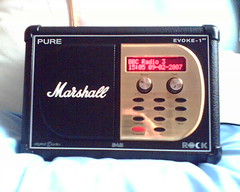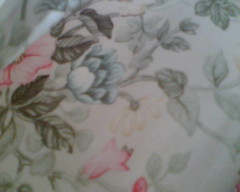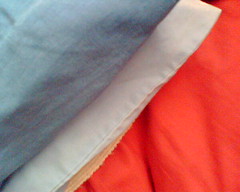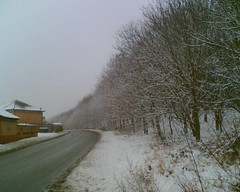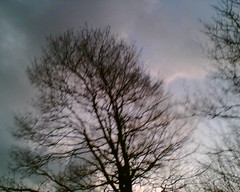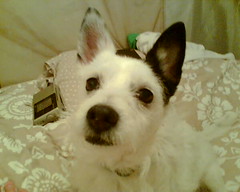Thomas and Denis in the Field
I strain to lift my backside off the ground and the weight on my shifts a little, so I settle back down onto the ground and push at the rags with my hands.
The rags are slippery wet, with something spongy inside them, but I get some purchase on them and they start sliding down my legs, the backs of which are aching with the effort and the use of unaccustomed muscles. I manage to get my knees up a bit, and give the rags an extra hard shove with my hands: my right palm goes through the gap between two folded edges, and my hand goes up to the wrist into something soft and gooey that feels like thick, warm engine grease. It feels horrible, and I jerk my hand back out, instinctively shaking it to get the gooey stuff off it. I feel some of the stuff spatter on my cheek and forehead. The weight’s off me, and I wriggle through the mud past the rags and out into the fresh air. I look down at my hand and it’s stained with red and brownish green slime: bringing it up to my face I can smell the iron smell of blood and a smell like shit.
There’s a mist of blood and muck sprayed across the snow and mud and up the back of the tank.
“Tommy.”
The rags and weight are his legs: I can see the nail heads in the soles of his boots gleaming whitely in the snow-reflected light. There’s bone and reddish-purple [?] flesh showing at the torn ends of his overalls, and bits of muck and skin in the snow and mud.
The shelling has all stopped, and the cold, snowy wind sound is audible again, brushing across the delicate surfaces of my ears. My cheeks feel very hot, and I’m dizzy. The air is swirling past me, and I’m swaying.
I lift my head up and turn around, looking back towards the road. There are some dark shapes on the snow within ten yards of me, but I don’t want to see them, so I look at the road in the middle distance. The second half-track has been hit; smoke is boiling off the burning engine compartment and the wood and canvas, and there are flames flickering underneath the chassis. There’s debris and dark shapes on the road.
There are a couple of men moving across the field towards me, but they’re blurry and they waver as I look. I shut my eyes and sit down in the wet snow.
When I open my eyes again the men are nearer, and I can see that it’s Albert and Franz from my crew. They’re carrying blankets. They crouch down beside me and put a blanket over my shoulders and one over my legs. They’re saying things, but my head is swimming and I can’t concentrate on the noise they’re making, and I just hear a gargling swirl, like the last water draining out of a bath.
I just nod to them. I’m all right. I’m not hurt.
I shut my eyes again and feel Franz and Albert’s masses move away from me. The sky wavers and sways.
They’re putting blankets over things.
Tommy resting the nape of his neck on the seatback as our truck raced along a dust-parched road during the exhilarating summer offensive in [France…]
They’re putting blankets over the dark shapes.
Twisted snakes and chunks of meat.
Thomas wrinkling his nose and screwing up his face as the man in the bar was sick, sick, sick with the striptease girls’ lights shining through it.
The stump of his spine sticking out of the meat of his [hips and thighs], and the gaping red-orange and black cavern of his viscera-emptied [ribcage], with the sheared-off ends of the ribs all white, like the nuggets of bone in a pork chop [a spare rib chop, in fact].
Helping Thomas walk home from the Henkel Works’ Christmas party, that first winter they’d worked there during their apprenticeship; Thomas had had too much to drink and was within one more word of getting into a fight with the older man who had danced with Thomas’ girl, and who had ended up with her on his arm later in the evening. Thomas’ legs working away automatically like a puppet’s while Denis had his fingers around the back of Thomas’ neck, half-holding him up and half-guiding him towards home.
Thomas’ dark hair flittering in the breeze, brushing against the powdery snow. One eye open and still, the other lost in a mess of blood and torn flesh where head has been sliced in two diagonally and the jaw, cheek, teeth and gums have been smashed and shredded, mangled into pulp and ribbons of flesh and skin and seared into a half-burned mask of hideous intricacy.
Thomas’ mother putting a coffee cup down on the unfamiliar dark wood nightstand next to the bed in the spare bedroom. The rain-filtered daylight breaking into the room when she draws back the curtain: illuminating the steam rising from the coffee a foot from his face and shining through the stretched fabric of her blouse where she’s reaching up to the curtain, so that, just for a moment, he can see her arm in dark silhouette, the white gauzey space under her arm, and the start of the shape of her breast.
He’s in the back of one of the half-tracks, stretched out across the bench seat, propped up with a rolled tarpaulin that someone has stuck down in the footwell. He’s cold. The sound of the engine, the rolling rhythm of the tracks and the thick, oily smell of the [doped/treated?] tarpaulin is making him feel sick. He shuts his eyes.
When he opens them again, it’s darker. He can see the sky through the crenellated cut-out shape of the half-track’s body [the metal pressing?]: there’s dark snow cloud blowing in, below whiter, higher cloud and the glimpses of blue beyond the white. The half-track has stopped, and the engine is stopped. He can smell cigarette smoke nearby, and he thinks he hears the sound of someone moaning or being sick. He’s cold, and the smell of the tarpaulin is rich in his nostrils; he can feel a growing soreness there where the chemicals are irritating the soft membranes.
I wonder what they have done with Tommy? Poor Tommy.
